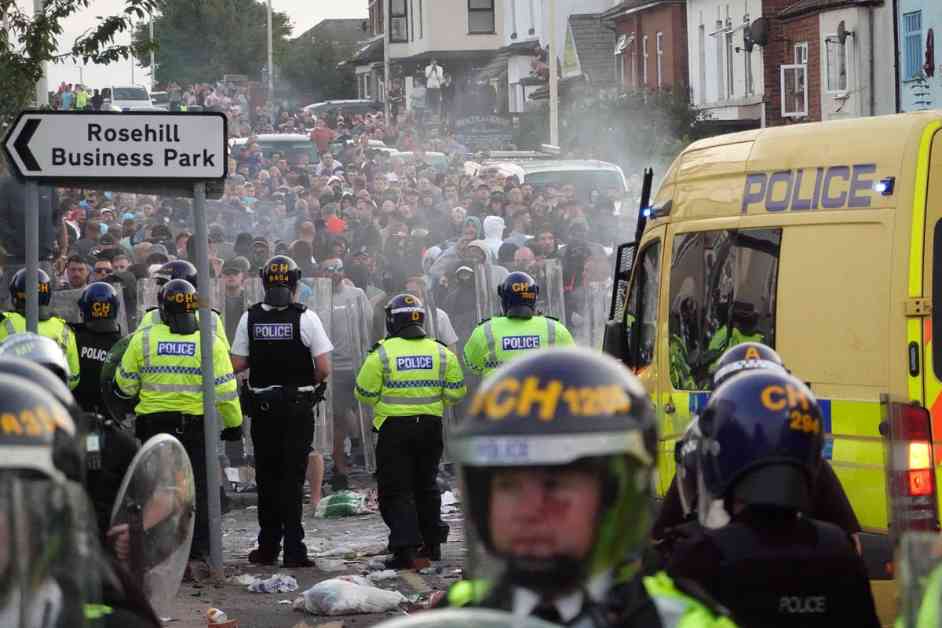15-Year-Old Boy Charged with Riot, More Violent Disorder Suspects Arrested
A 15-year-old boy has recently made headlines as the first person to be charged with riot in a surprising decision that could result in a maximum penalty of 10 years in prison. This comes as law enforcement agencies across the country are cracking down on suspects involved in violent disorder. The teenager, whose identity remains protected by legal reasons, appeared at South Tyneside Youth Court after pleading guilty to violent disorder and burglary in Sunderland. The severity of riot charges, which can carry double the sentencing of other offenses, is a clear indication of the authorities’ determination to hold individuals accountable for their actions during times of unrest.
National Consideration of Riot Charges
The introduction of riot charges is not limited to the north-east region of the country but is also being considered for nationwide implementation by the Crown Prosecution Service (CPS). This move signifies a shift towards a tougher stance on individuals engaging in criminal activities during periods of civil unrest. A senior officer at Northumbria Police emphasized that those suspected of further criminal behavior will be brought before the courts and charged with the most serious offenses possible. Assistant Chief Constable Alastair Simpson stated, “I hope this sends a really strong message that, no matter how old you are, if you took part in the recent appalling events in Sunderland, you will face really serious charges.”
However, the teenager’s defense lawyer expressed discomfort with the situation, both professionally and personally, highlighting the complexity and sensitivity of such cases. The presiding judge also acknowledged the unusual nature of the circumstances surrounding the case. The teenager’s legal proceedings have been adjourned to allow for further discussions between the defense counsel and the accused, underscoring the complexities of navigating the legal system in cases involving serious charges like riot.
Legal Consequences for Violent Disorder Suspects
In a separate incident, a man involved in the violence that erupted in Southport was sentenced to 30 months in prison for his role in the unrest. Tom Neblett, 20, was found guilty of throwing bricks at law enforcement officers and climbing on top of a van during the chaotic events. The situation in Southport, which unfolded near a mosque following a tragic triple stabbing incident, underscored the volatile nature of civil disturbances and the significant impact they can have on communities.
Across different regions, individuals involved in violent disorder have faced varying degrees of legal consequences for their actions. In Manchester, a man driven by racial hatred received a sentence of three years and two months for assaulting a black man during a period of disorder. The severity of the sentence reflects the gravity of racially motivated violence and the need to address such behaviors with firm legal measures. Similarly, in other instances, individuals who engaged in violent acts, such as throwing bricks at police or causing damage to property, received jail terms ranging from several months to over three years.
The diverse range of legal outcomes underscores the complexity of addressing violent disorder cases and the need for a comprehensive approach to holding perpetrators accountable for their actions. From instigating physical violence to inciting racial hatred, individuals involved in acts of disorder have faced significant repercussions through the justice system. These cases serve as a reminder of the importance of upholding the rule of law and ensuring that those responsible for causing harm and disruption are held accountable for their actions.
As the legal proceedings continue and more individuals are brought to justice for their involvement in violent disorder, it is crucial to maintain a balanced approach that upholds the principles of justice while also addressing the underlying factors that contribute to civil unrest. By holding individuals accountable for their actions and addressing the root causes of social tensions, law enforcement agencies and the legal system can work towards promoting peace and stability in communities affected by incidents of violence and disorder.
Conclusion
In conclusion, the recent developments in cases involving riot charges and violent disorder highlight the challenges faced by law enforcement agencies and the justice system in addressing acts of civil unrest. From the sentencing of individuals involved in violent incidents to the consideration of tougher legal measures, the response to such events underscores the importance of upholding the rule of law and ensuring accountability for those responsible. As legal proceedings continue and more individuals are brought to justice, it is essential to prioritize justice, fairness, and community cohesion in addressing the aftermath of civil disturbances. By working together to address the underlying causes of violence and disorder, society can move towards a future where peace and stability prevail.












